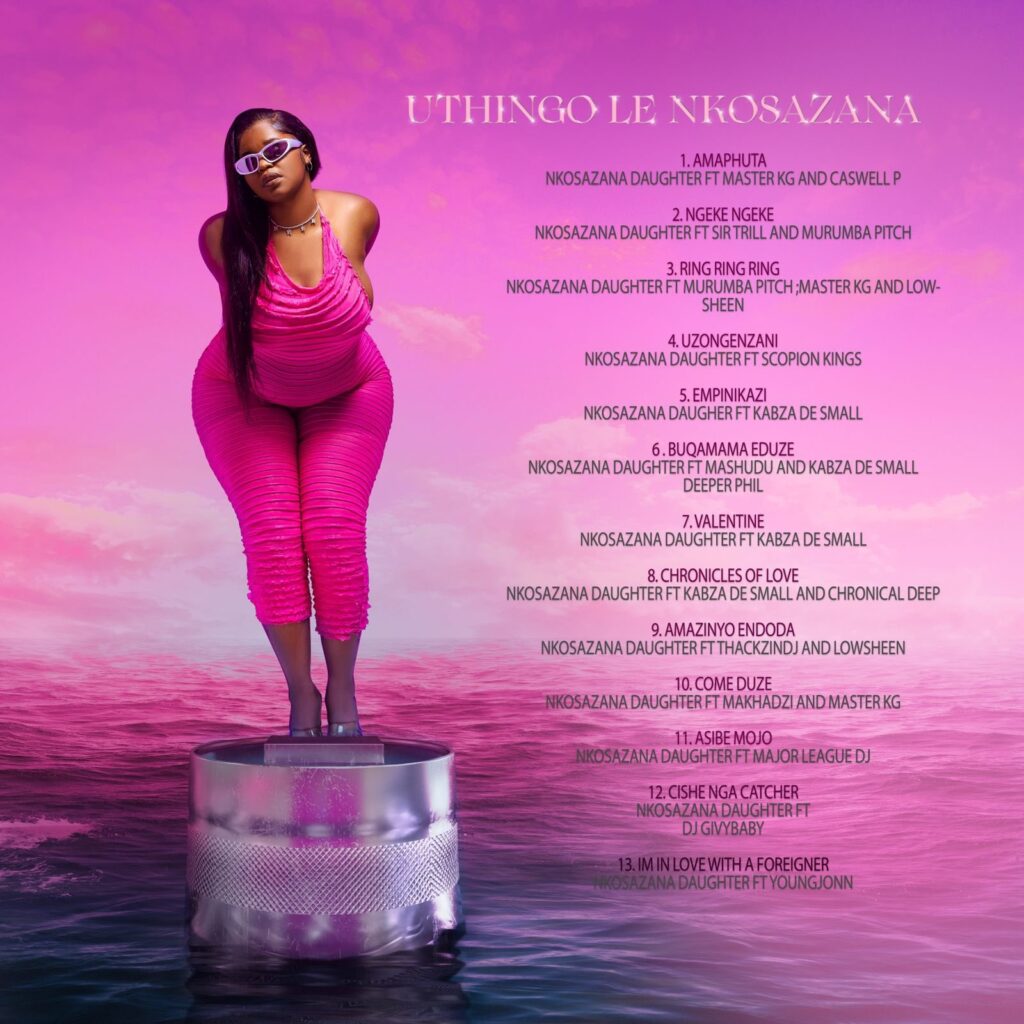Nkosazana Daughter holds her own amongst a star-studded cast and carries her debut deftly, displaying comfort and expertise well beyond her years…
By Yinoluwa Olowofoyeku
Nkosazanah Nolwazi Kimberly is a self-taught guitarist and vocalist hailing from Durban, South Africa. The 22-year-old is the only girl of 7 children, a fact that is rumoured to have influenced the title of her album, which translates roughly as “rainbow princess.” Uthingo Le Nkosazana is the debut album from the fast-rising Amapiano songstress, Nkosazana Daughter.
Daughter first graced stages as a poet in her university days before pivoting to music and releasing “Mirror” and “Bekezela” in 2019. Her career as an artiste began in earnest very recently, debuting with 2021’s “Izitha” which immediately carved out a niche for her unique ethereal brand of Amapiano. Her talents were instantly recognised by the major players, as her second credited appearance came as a featured artiste on Kabza De Small’s “Isoka” in 2022. In that year, she established herself as a household name by featuring on numerous hit singles such as Master KG’s “Dali Nguwe,” Lowsheen’s “Thula,” and DJ Givy Baby’s “Nomathemba.” In 2023, her rise to prominence was cemented as she was nominated in the “Best Female MVP” category at the SoundCity MVP Awards Festival alongside the likes of Tems, Tiwa Savage, Ayra Starr, Niniola, and more. As such, the stage could not have been set better for to release her debut project. Uthingo Le Nkosazana features collaborations with some of the most prolific Amapiano and House artists, allowing Nkosazana Daughter to showcase her full range in a star-studded environment.
(Read also: Dues Review: Sean Tizzle’s Work Is a Triumph of Talent and Growth)
The album begins with “Amaputha,” a defiant love song about looking beyond a person’s flaws in the name of true love. The emotion of the track is provided by the warm pad chords droning under Nkosazana Daughter’s soft vocals. Steady percussions and gentle log drums underscore delicate singing before the featured male artists take over the second half of the song, providing the reverse perspective topically, and a contrasting tonality musically. The instrumentals here play the role of a sonic backdrop, doing very little to usurp the attention from the vocal performances on display.
“Ngeke” comes next, introducing itself with a rumbling kick drum, energetic claps and syncopated percussions. A shimmering pad is supported by straightforward keys and a light-hearted bassline as Nkosazana Daughter and Murumba Pitch layer their vocals together to weave a narrative of an unwavering love. The log drums and synths spring to life sporadically as the song rises and falls in response to romantic sung passages. Both artistes reflect the chemistry of the song’s story in the way their vocals play against each other, creating a dynamic duet with layered harmonies and conversational call-and-response.
“Ring Ring Ring” was one of the album’s lead singles. The song served well to drive anticipation for the album. Nkosazana Daughter delivers an enchanting memorable chorus driven by the haunting “Ring ring ring” interspersed with her emotionally-tinged singing as she bares her heart to a lover who ignores her calls and refuses to communicate. Her singing on this song is chilling, with moments that are so ethereal, they feel almost devoid of actual lyrics. The song switches gears as marimbas and log drums kick in with Murumba Pitch’s response towards the back end of the song.

“Uzongenzani” announces itself with House-adjacent drums and rattling shakers. Electric pianos lay down the soulful backbone of the song, accompanied by sweetly-strummed guitars and light synth accents. The song takes a spiritual turn as Daughter speaks about having her ancestors and God watching over her. The song blooms and grows, with additional layers of instrumentation sneaking into the mix, such as trilling flutes and whistling synths. The instrumentals here are the co-star and not just the supporting act. Kabza De Small and DJ Maphorisa exemplify their production expertise, having the song shift and develop through its runtime, keeping the 8-minute duration from feeling like a slog.
Kabza De Small takes on double duties on “Empinikazi” as both vocalist and producer. His gruff tone blends with Daughter’s airy timbre as they navigate an instrumental built on energetic percussion-laden House drums and bouncy House bass synths. Together, they harmonise their way through the shortest song on the album, speaking on how they don’t need to fight battles on their own because God and the ancestors have their backs. The song outros with grand pianos and buttery Rhodes keys.
“Buqamama Eduze” is a meditative song that allows Nkosazana Daughter speak to her mother, assuring her that success is around the corner. The emotion of the subject matter is captured perfectly in the vocal performance, combining pleas for faith with self-confidence. Again, Kabza De Small’s production pedigree is instrumental to how much momentum the song is able to exude through its 6-and-a-half-minute runtime.
“Valentines” has been one of the breakthrough songs of the album cycle so far. Its strummed guitar backbone gives it a very different feel from many of the songs that came before it. The song finds Daughter pleading to be shown the romance and thoughtfulness befitting of a Valentine. Buzzy synths and grand pianos jump into the mix alongside deep log drums to give the song its well-earned dance breaks. They don’t hamper the emotional crux of the song; although I wish Nkosazana Daughter had been given more room for her emotive vocals on this track.
(Read also: Summer Breeze Review: Tay Iwar Lays Skill and Consistency on Full Display)
“Chronicles of Love” marks the transition into the second half of the album with a completely new feel, announcing itself with pounding kick drums, marching-like snares and powerful pianos. Atop this driving sonic landscape, Daughter utilises sparse vocal passages to introspect about losing herself in the pursuit of love. As the bassline drops in, Daughter matches it with wispy high notes and breathy backing vocals that touch heartstrings irrespective of the language barrier.
“Amazinyo Endoda” is a House inspired hustler’s anthem built on a simple bass synth pattern. Log drums dance around the song’s fairly straightforward House beat while electric pianos chime steadily across the bridge. Barring the sugary ululations on the bridge, this song feels very melodically tame respective to the songs around it. Nkosazana Daughter doesn’t hit the singing heights we’ve become accustomed to on this song, and so it feels like a lull especially on the back of the emphatic “Chronicle of Love.”
“Sibe Moja” picks the energy back up again with ghostly moving harmonies and floating high notes peppered across a deep rumbling bassline. This song is all about yearning for happiness, be it for Nkosazana Daughter herself or for her loved ones. Being the second longest song on the album, Major League DJz and LuuDaDeejay keep the song progressing with dance breaks and breakdowns. They aren’t quite as dynamic as Kabza De Small and DJ Maphorisa, but not many people are, and that can’t be held against them.
“Come Closer” is a happier song, asking a lover to stay close. While the song is not that long, it feels a bit underwhelming, perhaps because it lacks complexity. The instrumentals are very straightforward, featuring a basic chord progression expressed with elementary choral pads. The drums go unaltered all through the song and there isn’t much movement in the way of peaks or valleys to break the song up. The synth melodies are also quite lacklustre and the vocals themselves do not elevate the song much beyond that baseline.
“Cishe Nga Catcher” corrects the misstep, giving us another introspective emotional song carried by soulful Rhodes keys, and an understated House drumline. Bass log drums underscore the delicate vulnerable vocal delivery. Dreamy harmonies fill out the velvety soundscape in which Nkosazana Daughter reminisces on dodging a bullet with a partner who turned out not to be the one. There is that sense of loss and relief communicated through the deliveries alone, and it is almost uncanny how effectively she is able to do that.

Uthingo Le Nkosazana rounds off with its shortest song, “In Love with a Foreigner” featuring Nigerian producer Young Jonn. Previously released as a single, this song connected Nkosazana Daughter with a different audience as Young Jonn brings that Nigerian Afrobeats delivery to shake up Daughter’s formula. She displays her versatility by matching his pace, harmonising with him and adjusting her style with shorter phrases and more restrained melodies. The instrumentals are a bit elementary but the charisma of the two artistes carries the song through and closes the album on a fun note.
(Read also: Work of Art Review: Is Asake’s Album Simply a Work in Progress?)
Nkosazana Daughter is quoted as saying the album was supposed to be like a rainbow – colourful and full of everything. While Amapiano is her genre of expression, her influences extend into R&B, Afropop, Soul, and traditional African music. This gives her a wide range of stylistic nuance to embed into her art and this nuance is an important part of why her profile has expanded to where it currently stands.
Uthingo Le Nkosazana is very firmly rooted in Amapiano, stylistically. Thematically, it mostly centres around love, albeit with a number of different dimensions to it. The undoubted strength of the album is the uncommon quality of Nkosazana Daughter’s singing. The language barrier makes it difficult to suss out the nuances in her song writing, but her singing is her universal weapon. Her voice is pure of texture, smooth and unperturbed, and she wields it with mastery and dexterity. The lightness of her vocals allows them to float in and out of the soulful Amapiano beats she has chosen, pumping emotion and earnestness into the songs. She has the kind of voice that can move people to tears without words.
On the more emotional songs, this ability comes to the fore. She doesn’t even seem to need complex melodies or vocal acrobatics to impress with her singing. It’s simply the clarity of her tone, the deftness of her touch, and the sincerity of the emotion behind it that get the job done. She is vocally efficient, too, using the necessary harmonies, the right simple melodies, short and staccato lines where needed, longer flowing passages where they have maximum impact. This doesn’t mean she is perfect, though. There are the rare moments that come across slightly undercooked, where maybe more would have benefitted the song. However, the fact that she has this much understanding of her craft so early in her career is massively impressive.

The production across the album is mostly spot-on. Kabza De Small and DJ Maphorisa are standouts, continuing to show why they are the biggest names in the genre currently. Most of the songs have rich, soulful production, maximising a limited sonic palette. The drums are also mostly standard Amapiano fare, leaning heavily into the core House spectrum and easing up on the more percussive Afro elements. A few songs are unable to maintain the quality, with beats that feel uninspired or stagnant and repetitive. These wouldn’t be dealbreakers in most albums but the comparative difference between the other production on the album makes the misses more glaring. Technically, a vast majority of the engineering is decent to very good. While there are no glaring shortcomings, it does suffer a bit from time to time, with Daughter’s cornerstone vocals sometimes getting lost in the mix amongst instruments.
Altogether, Uthingo Le Nkosazana is a debut project wherein the artist consistently remains the best thing about each song. Nkosazana Daughter holds her own amongst a star-studded cast and carries her debut deftly, displaying comfort and expertise well beyond her years. My hope for her going forward is to hear her on more diverse production and see her lend her voice to a wider selection of themes.
Lyricism – 1.4
Tracklisting – 1.3
Sound Engineering – 1.5
Vocalisation – 1.8
Listening Experience – 1.3
Rating – 7.3/10
Yinoluwa “Yinoluu” Olowofoyeku is a multi-disciplinary artist and creative who finds expression in various media.



